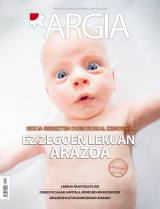When Euskaltzaindia turned the penis into a linguistic problem
- Who doesn't know Lur, the girl and the boy? Or also the so-called Hodei, Sahats, Lizar, Elorri, Aratz, Araitz, Izar, Amets, Iraultza, Amaiur, Iraitz, Izaro or Aritza. Is there any Basque who considers a problem that women and men share the same name? Where is the name of the land, where you see the manure and the dog? Well, the nomenclature created by Euskaltzaindia, located in Spain and following the guidelines of its law, has de facto banned what many Basques and Basques naturally use. Where there was no problem, it has created a problem for hundreds of people. Among them are those of our house.

Lur was born two months ago. Although he did not have an official name yet, Lur has been the head before and after coming out to this world. During pregnancy, we didn't want to know anything about their interval. In addition to the fact that the form of the genitals seemed to us to be a secondary issue, we didn't want to condition ourselves or our environment with clichés of a particular genus. We knew, therefore, that it was necessary to keep them when we were born for what to bring them forward. And in addition, adding to the surprise that nature had given us, we gave a nicer end to the beautiful adventure of pregnancy. However, childbirth was easier than the baby's name.
Currently, in the hospital itself, there is the possibility of taking the name of the daughters and sons to the register. You have two options: send the request to the local court where the parents are registered or to the place of birth. In our case, we received a call from the Zumaia official one hour after the request was sent to the Zumaia Peace Court: “In the Euskaltzaindia Nomenclature, Lur does not appear as a name for boys, so you have to choose another one in the next three days.” In the coming days with the official of Zumaia
In order to put a name in Basque in Euskal Herria to our son we go to Scandinavia thanks to the surreal recommendation of an honored official.
other times we had met with the same fence. Yes, I understood the problem. That he also knows some boys who call Lur, who doesn’t seem like a normal situation, but… Euskaltzaindia says the opposite and that he is to comply and enforce the law. That Euskaltzaindia says the opposite and that he is to comply and enforce the law. We also present some references of the Bravas Lands registered in Gipuzkoa in recent months, but “we cannot take them into account, these people are errors”. Although with a ‘mistake’ we told him that we would be very happy, he rejected the argument of precedents.
Seeing that nothing good was going to come in Zumaia, we went to the central court of the region, in Azpeitia. He presented our case to the official there and thought he was going to do a lot of work for him, so he dedicated himself to taking it away from him. He told us that if we found the word Lur in another language, there would be no problem, and that in order to go calm – understand, fast – to Zumaia, it would be resolved quickly.
Out of
use, in a wolf house to be able to name our son in Basque, we went to Scandinavia thanks to the surreal recommendation of an honored official. And so we found that in northern Europe, Lur is a musical instrument, kind of like the didgerid. In Hernani a family managed to register and we present this reference. The response of the Zumaia official was anthological: I am sorry, but it is not clear whether this instrument is male or female. “And how is sex to an object?”, as the crickets answered to our question, we decided to file a formal appeal in the Azpeitia Court, this time yes, along with the family books of several children registered in Zumaia, Zarautz and other locations like Lur in recent years. The reply took several days to arrive. “Euskaltzaindia is the only reference for these cases, therefore…”
Seeing that the
officials were not willing to repent, he started the “lowering” of the names. The first offer was Lhur. German name. A man. A lot. For this intermediate H, or. Then we got to know the case of his compatriot Lhur, who wanted to put his son on land and had to put the German on him. Those who have lived these first days after birth know very well what the physical and mental tiredness generated by this nervousness, this concern and this lack of sleep is. With the emotions rising and descending as in the Swiss Mountain of Igeldo, as it is not easy to argue in court about the dog and the name of your child.
“Lur is a word that any Basque can understand, it is not insulting and in Donostia there are many children of the same name.”
During this time, no subsidies can be applied for, sick leave can be processed, the girl can be registered at home or her health card issued. In all of them, the family book is essential. We realized the magnitude of the problem when we were told that we had five days to choose the name, otherwise the judge would choose the name of our son.
Following a similar case to ours, we decided to take the test at the Durango Court. There were some previous cases in which they were more cordial. In view of our case, he was willing to cooperate – we did not know – in the house of a person from Durango and that morning we tried to do so in court. But the doctrine of Euskaltzaindia came there before us.
We started to see ourselves in the same situation as other parents we met along the way: opposing our son another name and preparing a trial with an attorney. In the absence of two days to complete the deadline, as a last option, we went to the Donostia-San Sebastian Court. Confident that loyalty to the law of officials would be commensurate with the size of the court, we had little hope. Because we're not married, the law says that the only person who can prove who the father is is the mother, so the couple, the two-week old boy and I were circling in court. Since then, we began to believe that what we asked the officials for was a crime.
But sometimes Murphy's law was favorable, and to our surprise, we met with the only official who functioned with humanity throughout the court and naturally addressed the subject of the name: “Lur is a word that any Basque can understand, it is not insulting and in Donostia there are many children of the same name.” The “problem”, which lasted two weeks, was solved in 15 minutes. The son is Lur, even before the law.

Euskaltzaindia Tra(d)izio
Our case has been difficult and disappointing, but the legislative procedure could be made much more complicated: if the child did not have a father, if the parents were lesbians or homosexuals or if the mother had problems in childbirth and could not move from bed in the following days. In each case, how many people have been changed to Euskaltzaindia as the default name? How many of you have had to put Ibai Lur or her daughter against her will?
Before the problem arose out of nowhere, Euskaltzaindia had the possibility of claiming an exception for Euskaldunes names. In addition, it was easy. The Basque language is a grammatical free language, there are a number of names for all genders and there are thousands of people who have those names. The Basque Language Academy, composed primarily of men, has preferred distinction and therefore prohibition and, in our view, has taken advantage of the regressive interpretation of tradition.
Many sectors of today's society are questioning the gender roles imposed by capitalism. Women as women and men as men are questioning the laws and social norms that force us to act, dress or love. Because they are aware that uses and culture in general are not static, but vary according to the needs and demands of each era. By saying that distinguishing names according to genitalia is cultural, Euskaltzaindia is reaffirming that it is an arbitrary option. Is the “tradition” that allows the child to be punished and prohibits Lur or Eneritz what we want to perpetuate? This is not just a linguistic issue, because behind the name is the free choice of people.
The use of the tradition of avoiding debate only generates frustration. Ask if not, what you left in Irun or Hondarribia. It’s time to get this debate out of the “experts” offices and spread it in society. To give recommendations is to be welcomed, but not to do.
More information on the report "Gurasoen Nahia Euskaltzaindiaren mende"

Bai, bai, holaxe. Ez naiz harago joatera menturatzen. Pleonasmo bat dela? Tautologia bat agian? Baliteke, baina egia-oste deitzen dioten garai honetan, oinarri-oinarrizko egitateak beharrezkoak dira. Begira, bestela, “Ez da ez!” lelo indartsuari. Bagenekien hori... [+]
Euskaltzaindiak 2001etik aurrera sexuaren araberako bereizketa finkatu zuen izenetan baina IKAren Deklinabidea aplikazioa garatzen ari nintzela salbuespenak badirela konturatu nintzen. Badaude Euskaltzaindiaren gizonezkoen eta emakumezkoen ponte-izenen zerrendetan, bietan,... [+]
Euskaltzaindiak adierazi du aurki Ministerioarekin euskal izendegiarentzat “bestelako bideak asmatzeko” harremanak hasi nahi dituela.
Abuztuaren 1eko Teleberrian ARGIAren azken aldizkarian argitaratu dugun euskal izendegiari buruzko erreportajea eta analisia izan dituzte hizpide. Etxean semearen izenarekin bizi izan dugun kasuari buruzko albistean, Euskaltzaindiko kide batek aitortu du izendegia sortzeko... [+]
“Izena eta izana ezbaian” gida praktikoa aurkeztu dute Bilgune Feministak eta Emaginek. Euskarazko izendegiaren binarismoaren inguruko gogoeta piztu nahi dute.
When it was already a choir, we came up with the idea of the Queer theory, not so long ago, and it promoted debates among friends. Young friends told us that the sexes aren't just two, they're a blast. We, on the other hand, are two, from the point of view of their role in... [+]
Kontsulta jarri beharko dut martxa honetan. 2007ko urrian erreportajea idatzi nuen Hego Euskal Herrian jaioberriaren izenaren sexuarekin eta grafiarekin dauden arau zorrotzei buruz (malguagoak dira Iparraldean), eta oraindik zalantzaz beteriko iruzkinak jasotzen ditu... [+]
- "Euskal izendegia. Ponte izendegia. Diccionario de nombres de pila. Dictionaire des prenoms" liburua aurkeztu zuen ostiralean (14) Euskaltzaindiak, Eusko Jaurlaritzako Justizia Sailaren babesarekin. Bertan, 2.264 izen jaso dituzte bakoitzaren azalpen eta guzti... [+]




















